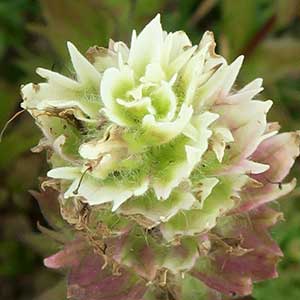Castilleja parviflora var. albida
Castilleja parviflora
mountain Indian paintbrush, pale small-flower paintbrush, white Indian paintbrush, white small-flower paintbrush
magenta paintbrush, mountain Indian paintbrush, mountain or rosy or small-flower paintbrush, small-flower paintbrush
several or many, erect or ascending, unbranched except for short, leafy axillary shoots, glabrate proximally, hairy distally, hairs sparse, spreading, ± matted, long, soft, minute-glandular.
broadly, sometimes narrowly, lanceolate to elliptic, margins plane to ± wavy, (0–)3–5(–7)-lobed, apex acute to obtuse;
lobes ascending, lanceolate.
green or gray-green to purple-tinged or deep purple, often blackening on drying, narrowly to broadly lanceolate or elliptic, rarely linear, 1.5–5 cm, not fleshy, margins plane, sometimes ± wavy, flat, (0–)3–9-lobed, apex acute to acuminate or obtuse;
lobes spreading or ascending, linear, sometimes lanceolate, much narrower than terminal lobe, evenly spaced, short, apex acute.
distally white to cream, sometimes suffused with pink to purple, 3–5(–7)-lobed;
lobes lanceolate, arising at or above mid length.
2–16 × 1–3.5 cm;
bracts proximally greenish, dull, deep purple, or reddish purple, distally pink, pink-purple, magenta, deep rose, crimson, cream, or white, sometimes red, pale orange, or red-orange, lanceolate to broadly elliptic or ovate, 3–7-lobed;
lobes spreading to ascending, linear, lanceolate, or lanceolate-acuminate, short to medium length, arising at or near mid length, apex obtuse to acute, central lobes sometimes rounded.
12–20(–25) mm;
tube 8–11 mm; subequal to calyx or beak exserted, 5.5–8 mm;
abaxial lip green, brown, or yellow;
teeth white to yellow, sometimes pinkish.
straight or slightly curved, 12–30 mm;
tube 8–19 mm;
beak exserted or subequal to calyx, adaxially green-yellowish or red, 5.5–11 mm;
abaxial lip green, brown, or yellow, sometimes purple, reduced, slightly or not inflated and pouched, 1–3 mm, 20–45% as long as beak;
teeth erect, green, white, yellow, pink, or red, 0.5–2 mm.
green to purple or red, distally white to pink, 12–17(–21) mm;
abaxial clefts (6–)7–8 mm, adaxial 8–10 mm, abaxial ca. 40% of calyx length, adaxial ca. 33% of calyx length, lateral 2–6 mm, 15–25% of calyx length;
lobes triangular, apex acute, sometimes obtuse.
colored as bracts, 12–28 mm;
abaxial and adaxial clefts 6–15 mm, 40–70% of calyx length, deeper than laterals, lateral 1–8 mm, 10–35% of calyx length;
lobes narrowly to broadly triangular, sometimes distally expanded and flaring, petaloid, apex obtuse or acute, sometimes rounded.
= 24, 48.
Castilleja parviflora var. albida
Castilleja parviflora
Variety albida is found in the Cascade Range of southern British Columbia southward to the Wenatchee Mountains of Washington. In central British Columbia, the point of transition into var. parviflora still needs definition. Variety albida is characterized by whitish to cream bracts, although some plants in Okanogan County, Washington, have pink or purple bracts in mixed populations with white-bracted plants.
(Discussion copyrighted by Flora of North America; reprinted with permission.)
Varieties 4 (4 in the flora).
Castilleja parviflora is a complex, geographically widespread, and often misunderstood species ranging from southeastern Alaska through much of British Columbia, southwestern Yukon, and the Rocky Mountains of extreme western Alberta and southward in the Cascade Range to central Oregon.
(Discussion copyrighted by Flora of North America; reprinted with permission.)
1. Corollas (18–)20–30 mm; calyces 20–28 mm; leaves (0–)3(–5)-lobed; Oregon, Washington. | var. oreopola |
1. Corollas 12–20(–25) mm; calyces 12–20(–28) mm; leaves (0–)3–9-lobed; Washington to Alaska, Alberta, and Yukon. | → 2 |
2. Bracts distally white to cream, sometimes suffused with pink to purple; herbs 0.6–2.7 dm; n Cascade Range, Washington and s British Columbia. | var. albida |
2. Bracts distally pink-purple, magenta, deep rose, or crimson, rarely white; herbs 1.2–5 dm; Olympic Mountains, Washington, w Canada, se Alaska. | → 3 |
3. Leaves (3–)5–9-lobed; corolla beaks 5.5–7 mm; Alberta, British Columbia, Yukon, Alaska. | var. parviflora |
3. Leaves (0–)3(–5)-lobed; corolla beaks (5.5–)7–9(–11) mm; s Vancouver Island, British Columbia, Olympic Mountains, Washington. | var. olympica |
- Local floras:
BC,
CA,
OR,
WA
- Local Web sites:
CalFlora,
CalPhotos,
Flora NW,
PNW Herbaria,
Turner Photog.
WildflowerSearch
iNaturalist (observations)
USDA Plants Database
- LBJ Wildflower Center
- SEINet
- Plants of the World Online
- Encyclopedia of Life
- Wikipedia
- Google Image Search


